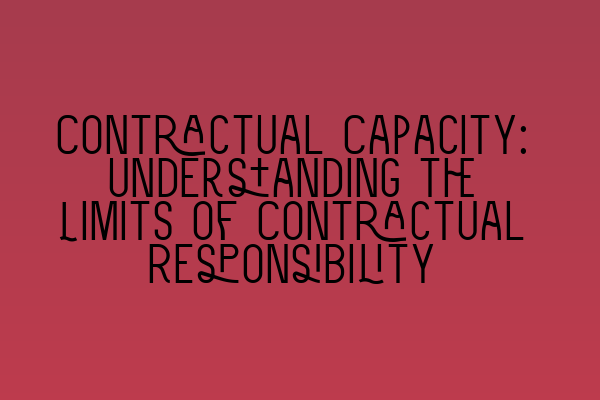Contractual Capacity: Understanding the Limits of Contractual Responsibility
In contract law, one of the fundamental principles is that parties to a contract must have the necessary capacity or ability to enter into the contract. This concept is known as contractual capacity, and it plays a crucial role in determining the validity and enforceability of a contract. Understanding the limits of contractual responsibility is essential for both solicitors and individuals involved in contractual agreements.
What is Contractual Capacity?
Contractual capacity refers to the legal ability of an individual, or a party, to understand the nature and consequences of a contract and to make an informed decision to enter into it. It ensures that the parties to a contract have the mental and legal competence required to be bound by the terms of the agreement.
Generally, the law recognizes that individuals of a certain age and mental capacity are capable of forming valid contracts. However, there are exceptions and limitations to this general rule. Let’s explore some of the key factors that influence contractual capacity.
1. Age: Minors and Contracts
One significant limitation on contractual capacity is age. Minors, individuals under the age of 18, are generally considered to lack the legal capacity to enter into contracts. The reasoning behind this is that minors may not have the necessary understanding and judgment to fully comprehend the implications and consequences of a contract.
While contracts entered into by minors are generally voidable, there are exceptions to this rule. For example, contracts for necessaries, such as food, clothing, and shelter, are typically binding on minors. Additionally, contracts entered into by minors that relate to their employment or education may also be enforceable.
2. Mental Capacity: Understanding the Consequences
Another crucial aspect of contractual capacity is mental capacity. Mental capacity refers to a person’s ability to understand the nature and consequences of a contract. It involves having the cognitive ability to comprehend the terms and make an informed decision to enter into the agreement.
If an individual lacks the mental capacity to understand the implications of a contract due to factors such as mental illness, intellectual disability, or intoxication, their contractual capacity may be limited. In such cases, the contract may be voidable, depending on the severity of the impairment and whether the other party was aware or should have been aware of the limited capacity.
3. Fraud, Duress, and Undue Influence
Apart from age and mental capacity, contracts may also be voidable if they are entered into as a result of fraud, duress, or undue influence. These factors can undermine a person’s free will and ability to make an informed decision.
Fraud occurs when one party intentionally deceives another party, leading them to agree to terms they would not have agreed to otherwise. Duress refers to situations where a party is forced or compelled to enter into a contract against their will. Undue influence, on the other hand, refers to situations where one party takes advantage of a position of power or trust over the other party, influencing their decision-making.
When a contract is affected by fraud, duress, or undue influence, the affected party may have the option to rescind or set aside the contract.
4. Legal Capacity: Corporations and Organizations
While most discussions around contractual capacity focus on individuals, it is essential to note that legal entities, such as corporations and organizations, also have contractual capacity. These entities can enter into contracts through their authorized representatives, typically directors or officers.
However, it is crucial to verify the authority of the person representing the entity and ensure that the contract aligns with the entity’s bylaws, articles of incorporation, or other governing documents.
Understanding the limits of contractual responsibility is not only important for individuals entering into contracts but also for solicitors and legal professionals advising their clients. It is essential to consider various factors, such as age, mental capacity, fraud, duress, and undue influence, to determine the validity and enforceability of a contract.
For comprehensive preparation in contract law and other topics relevant to the SQE exams, consider taking SQE preparation courses. These courses provide in-depth knowledge, exam practice, and valuable resources to help you succeed in your legal career.
To test your knowledge and enhance your exam preparation, you can also try SQE 1 Practice Exam Questions and SQE 1 Practice Mocks FLK1 FLK2. These resources are designed to simulate the SQE exam experience and help you identify areas for improvement.
Stay informed about the latest SRA SQE exam updates and important dates by referring to the SRA SQE Exam Dates page.
In conclusion, understanding the limits of contractual responsibility is crucial in contract law. By considering factors such as age, mental capacity, fraud, duress, and undue influence, solicitors and individuals can ensure that contracts are valid, enforceable, and protect the interests of all parties involved.
